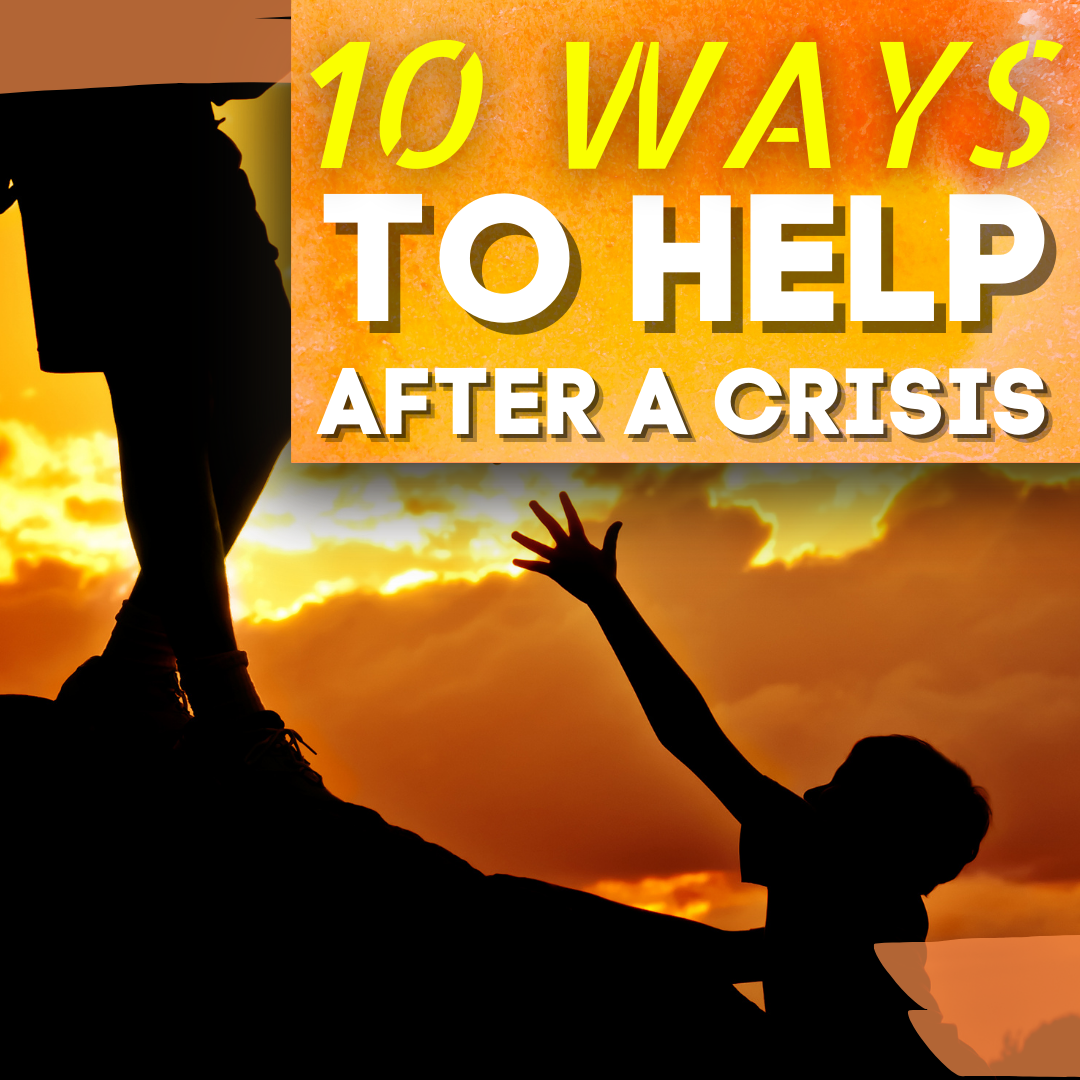
10 Ways to Help After A Crisis

When crises happen around the world, the first reaction for many is to turn and run the other way. But if everyone turns and runs, who is left to help people deal with the danger so it can be resolved and those people affected can move forward?
The reality is, throughout the world whenever tragic events happen, there are people that stay back to do the necessary, typically dangerous tasks that help affected community members progress back to normal. These people who stay back in the face of danger are true heroes and all posses the tools and strategies necessary to assist unfortunate people effected by tragedy or natural disaster. If you want to be calm and cool in the aftermath of crisis, or just want to know what you can do to help and do your part after catastrophe to help your community, here are 10 ways you can help after a crisis.
#1 Survey the Area & Keep your Guard Up
Right after disaster is the time to be ready for anything to occur. Power lines may be down, floods may be filling the area, whatever it is that is happening around you, keep a cool head and be careful where you venture. You may need to help locate missing people or may need warn others of any trouble ahead. It may be a good idea to stay put where you are at but that depends on the situation of course. An off-road vehicle or truck may be your best bet to get around, just remember that power lines and traffic lights may be down. Be safe, and avoid cell phone distractions. Use a 578UVIII Plus to safely communicate and drive and provide the latest updates to family, friends, and the surrounding community.
#2 Radio Communication
Radio Communication, as we've touched on already, is a vital way you can help during or post-crisis. If you want to learn more about two-way radio beneifts during an emergency, you can read more into that here. Two-way radios provide quick, short, and to-the point communication, perfect for contact in the aftermath of a natural disaster. Use more simple radios like our Echo GMRS radio for shorter-distance communications and use something like the 878UVII Plus when needing to transmit to longer ranges in order to survey a wide area, or communicate to emergency services in a dire situation. Be sure to also utilize other forms of communication if possible as well. Social media hashtags & instant messaging can be utilized as well for either personal or widespread contact-making.
For a complete emergency solution check out our Handheld Emergency Prep Bundle
#3 Cooking
Food is always becomes a priority quickly in a disaster. Once things are slowly starting to get figured out after the worst has already passed, remember the first tip, to keep your guard up, as anything can still happen, even when things seem to be calming down. But if at this point, you are sure it has passed, food will be a necessity to all those caught up in the situation, and for those helping to resolve it. Everyone can appreciate a hot (or even cold) meal, especially when there's not a lot of food to go around. If you can cook even a little bit, you can provide some comfort, hope, and might even save some lives.
#4 Gardening/Canning
For more extreme situations, gardening and canning is a great tool to help supply food to people that can last for a long time, and can also be a sustainable food source for long periods. Canned food is known to be long-lasting, and with the proper preservatives, can last years and years. In the meantime, stores and gas stations will be closed as their inhabitants may have fled or been evacuated. Food that will stay good for the long term is one of your best friends when you may be struggling to eat anything you can find.
#5 Carrying a Weapon
Time to leave that safe-and-sound feeling in the past. During a crisis, the landscape you have likely known for a long time has completely changed and won't function the same way. That's why having a weapon can bring some safety back to your family. There are always those who try to take advantage of situations like this that you will need to watch out for. But more likely is the case that you will need different types of food sources like small game or deer. Carrying a gun or knife greatly increases your safety and gives you another path to creating food for yourself.
#6 Keep Kids Safe and Entertained
Someone is going to have to keep the kids in check and under control. Because it's even more important than usual that children are not adding to the chaos of the situation. It may be a good idea to equip them with something like the Buddy or Echo radio to keep in close contact, even if they are only a short distance away. If they aren't old enough to help you navigate this scenario, just try to keep them calm, and teach them incremental lessons that will help them as they grow, especially when you know this may be a prolonged journey back to normal.
#7 Fixing Things
Electrical skills, construction skills, and medical skills can all be heavily utilized post-emergency. You may need to fix buildings, clear a tree that has fallen in the road, or treat a severe wound. Anything you can fix at this point is likely a huge asset to your community. Construction skills can be used to build a quick lean-to for multiple families. Electrical skills can help restore power to houses or help clear up electrical dangers. Medical skills can be used to help treat broken bones, clean an infection, or spot a concussion among many other skills. If you have the skill to build, treat, or restore, make sure your getting the most out of what you know.
#8 Skill Building
Building the skills and giving the knowledge you have to those around you is a great way to progress a community and start building it back after a crisis occurs. Use the skills from our last tip and teach what you know to others. Now instead of you fixing an issue by yourself, those around you can be equipped so you can essentially multiply yourself in a community that may need a lot of repair, both physically and emotionally. Make sure you are spreading your skills out and teaching them to the members of this community so you can all help restore it together.
#9 Donate Water, Food, & Other Goods
Donations are a huge and impactful way you can help after a crisis. Food and water are going to be vital for survival and morale and anything you have to offer can be used. Maybe you know how to filter water naturally in some way, or maybe you have cooked for large groups of people before. Use any skills or extra rations you can spare for the community at risk. There are likely numerous possessions that got lost or swept away in this situation and anything you can spare that you don't need for you and your family can be utilized to strengthen your community as a whole. Also remember blood donations are going to be needed badly in some cases, so be ready to give, give, give.
#10 Animal Care
Animals may be displaced and/or may need someone to watch after them so people working to restore the community do not have to keep an eye on them. It's important to have someone look after them and keep them calm. Animals running around can cause even more disruption in an already chaotic situation. Dogs and cats are the usual suspects to keep track of, but you may be in a community with chickens, goats, pigs, or horses. Try your best to do what you can to keep you community's animal care organized.
When a natural disaster or crises occurs, these 10 ways should give you some things to think about if your own, or a neighbor community is ever effected. Keep your guard up, donate what you can, and most importantly, use the skills that you posses to teach and support to help this society get back to what it once was.
For a complete emergency solution check out our Handheld Emergency Prep Bundle







1 comment
It’s great that donations are a huge way to help after a crisis. With that in mind, I would think that it would be a good idea to give monthly donations to a local food bank. This would be a good way to help people that are struggling to feed their families in your area. https://lampkinfoundation.org/community-food-pantry